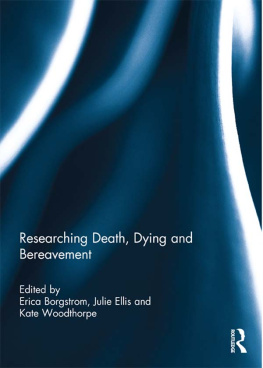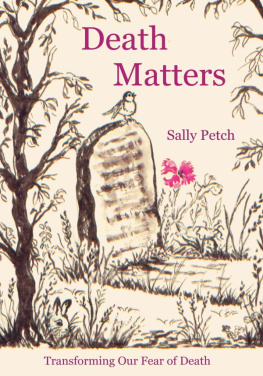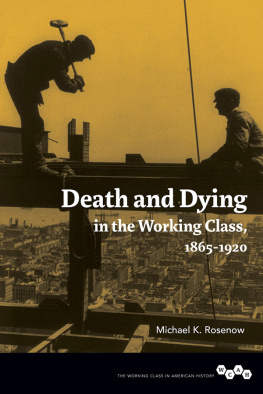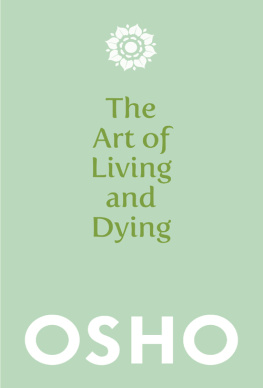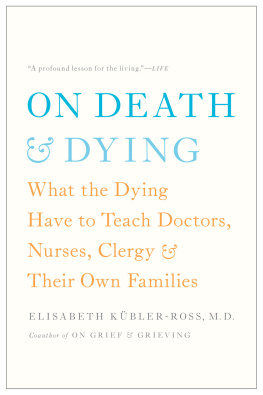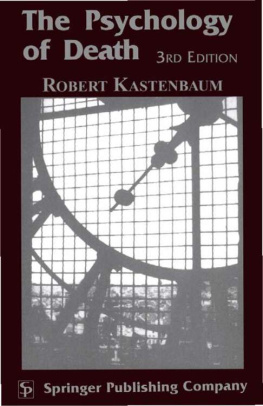Death in the Modern World
Death in the Modern World

- Los Angeles
- London
- New Delhi
- Singapore
- Washington DC
- Melbourne
SAGE Publications Ltd
1 Olivers Yard
55 City Road
London EC1Y 1SP
SAGE Publications Inc.
2455 Teller Road
Thousand Oaks, California 91320
SAGE Publications India Pvt Ltd
B 1/I 1 Mohan Cooperative Industrial Area
Mathura Road
New Delhi 110 044
SAGE Publications Asia-Pacific Pte Ltd
3 Church Street
#10-04 Samsung Hub
Singapore 049483
Tony Walter 2020
First published 2020
Apart from any fair dealing for the purposes of research or private study, or criticism or review, as permitted under the Copyright, Designs and Patents Act, 1988, this publication may be reproduced, stored or transmitted in any form, or by any means, only with the prior permission in writing of the publishers, or in the case of reprographic reproduction, in accordance with the terms of licences issued by the Copyright Licensing Agency. Enquiries concerning reproduction outside those terms should be sent to the publishers.
Library of Congress Control Number: 2019949071
British Library Cataloguing in Publication data
A catalogue record for this book is available from the British Library
ISBN 978-1-5264-0293-6
ISBN 978-1-5264-0294-3 (pbk)
Editor: Natalie Aguilera
Assistant editor: Eve Williams
Production editor: Katherine Haw
Copyeditor: Solveig Gardner Servian
Proofreader: Rebecca Storr
Indexer: Cathryn Pritchard
Marketing manager: George Kimble
Cover design: Francis Kenney
Typeset by: C&M Digitals (P) Ltd, Chennai, India
Printed in the UK
At SAGE we take sustainability seriously. Most of our products are printed in the UK using responsibly sourced papers and boards. When we print overseas we ensure sustainable papers are used as measured by the PREPS grading system. We undertake an annual audit to monitor our sustainability.
About the Authors
Tony Walteris Emeritus Professor of Death Studies at the University of Bath, UK. His research into death and society has included end-of-life care, social networks and care, funeral practice, bereavement, spiritualism, belief in reincarnation, the idea that the dead become angels, mass media and social media, pilgrimage, and the use of human remains in exhibitions. He has lectured around the world, and has also trained clergy and funeral celebrants. His 17 books include
Funerals (1990),
Pilgrimage in Popular Culture (1993),
The Revival of Death (1994),
The Eclipse of Eternity (1996),
On Bereavement (1999), and
What Death Means Now (2017). Before 1994, he was freelance, writing books and articles on religion, landscape, social security reform, and basic income.
Acknowledgements
It would be impossible to acknowledge everyone who over thirty years has in one way or another influenced this book. Of course, none of them are responsible for the result.
Among the many who have stimulated and extended my sociological imagination, I am particularly indebted to David Clark, Grace Davie, Christie Davies, Franois Gauthier, Allan Kellehear, Linda Woodhead, Michael Young, and Shahaduz Zaman. I have also greatly benefitted from belonging to the University of Baths Centre for Death and Society, not least its mind-stretching seminars and conferences and its academic visitors from around the world. The University librarys extensive holdings and ever helpful staff have also been invaluable. Further afield, I have been sustained by regular meetings with kindred scholars in Alba Iulia (Romania), Dumfries (Scotland), Nijmegen (the Netherlands), Sigtuna (Sweden), Zurich and Fribourg (Switzerland); and I have valued feedback on public lectures given in Denmark, Germany, Romania, Japan and New Zealand where I outlined the framework which eventually became this book.
Many international students and kind hosts around the world have opened my eyes to how others do death, including Kumiko Hori and Hiroshi Yamazaki (Japan), See Mieng Tan (Singapore), Ruth McManus (New Zealand), Kingston Kajese and Jenny Hunt (Zimbabwe), and Renske Visser (the Netherlands). Practitioners in several countries have taken time to show me around their hospice, funeral parlour, crematorium, temple, or shrine. Friends and colleagues with no specialist knowledge have gone out of their way to help in one way or another; Maya van Trier (Belgium), Jan Otto Andersson (Finland), Bruce and Val Ayres-Wearne (Australia), Stephen Nickless, and Peter Cressey (UK) are just a few who come to mind. Thank you also to my Sociology students for permission to quote from their class memos.
And so to the book itself. Thank you to Joanna Wojtkowiak who back in 2009 suggested I write the book. SAGEs nine yes nine anonymous reviewers offered constructive comments on the original proposal, many of which I have incorporated, and the following have given helpful feedback on various chapters: Candi Cann, Chao Fang, Cynthia Goh, John Harris, Ida Marie Heg, Christoph Jedan, Annika Jonsson, Anne Kjaersgaard, Rebekah Lee, and Nina Parish.
Finally, my sincere thanks to Mandy Robertson for providing a place and the time in which to write.
If I have forgotten anyone, please accept my apologies. And if the book has got anything wrong, which given its breadth is entirely possible, the responsibility is mine alone.
Introduction: Deaths Jigsaw
Death comes to all humans, but how death is managed, symbolized and experienced varies widely, not only between individuals but also between groups. What then shapes how a society manages death, dying and bereavement today? Are all modern countries similar? How important are culture, the physical environment, national histories, national laws and institutions, and globalization? This is the first book to look at how all these different factors shape death and dying in the modern world in other words, the first book to attempt to complete the entire jigsaw.
Many writers contrast death in the modern world with previous eras. There is a heroic narrative of modern medicine and sanitation banishing infectious disease and radically increasing human longevity. And there is another narrative of increased psycho-social risk, as medicalization and professionalization detach dying and bereaved people from the community and religion that are nostalgically supposed to have supported them in past times. I do not peddle either narrative. I argue that what is distinctive about modern dying and grieving, and there is much that is distinctive, interacts with culture, environment, economic (in)security, and national history and institutions to create considerable variety.
Thirty years ago, as I was writing the book that comprised my first venture into this field (Walter, 1990), I felt my writing was slipping and sliding around. One paragraph was certainly true of England, but probably not Scotland or Northern Ireland; the next paragraph might be true of all English speaking societies; the next of all advanced industrial societies throughout the world; the next of northern western European countries but not of Eastern Europe, Mediterranean Europe or the USA, and certainly not of Japan or China; and so on, and so on. But it was not an academic book for which precision was essential, so I carried on writing regardless.


